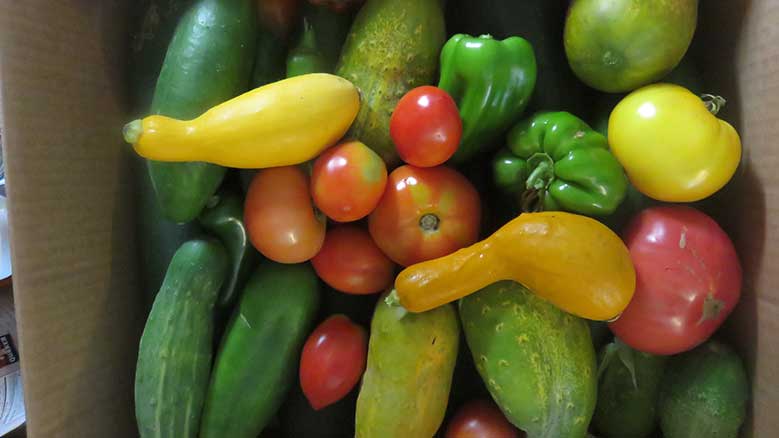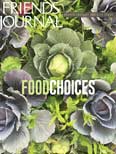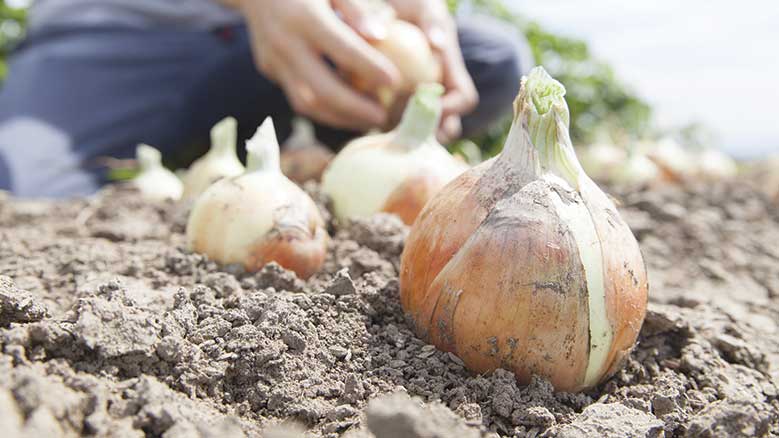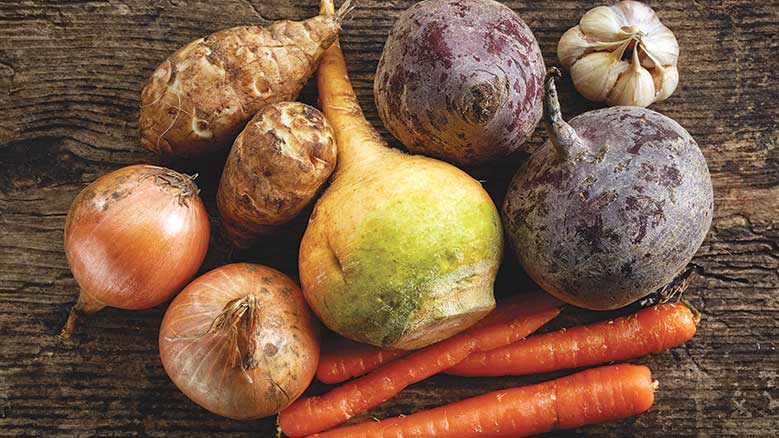
I have used food to define who I am (or am not). I call myself a vegetarian, although I’ve long eaten seafood when I’ve known where it comes from, and now do the same with poultry. So what does it mean to label myself that way? (My mother had a friend from India who said she was vegetarian because one day a week she did not eat meat.) It is a convenient label to tell people “don’t expect me to eat meat” without going into “where does this chicken come from?”
When asked how long I’ve been vegetarian my standard answer has been, “I believe I was born vegetarian and went through a meat-eating phase.” I remember as a child not wanting to eat animals, although I didn’t make the connection that the thin-sliced ham I liked to eat came from a pig! I’m grateful that my parents did not force me to eat meat. I could always request scrambled eggs, and having that choice granted seems to have been an early manifestation of God’s grace: “Ask and it shall be given unto you.”
This food choice may have hampered my social life, as I was hesitant to eat at friends’ houses, go on Girl Scout camping trips, or other places where I might be expected to eat meat. I didn’t learn to assertively say, “No, thank you,” and I was relieved when I discovered that saying I was allergic to meat allowed me to avoid the ground beef-pasta casserole served at the church youth group. “Vegetarian” was not in my lexicon at that time. In hindsight, I imagine people thought I was a picky eater, although it’s not a label I’ve put on myself.
As a teenager, I made a different choice and ate meat to fit in with my peers. (American teens eat hamburgers, don’t they?) As a young adult, I lived in Germany where my in-laws raised much of their own food with a garden in the yard, two pigs next to the garage, and a row of potatoes. It was an efficient system: the pigs ate garbage and potatoes and provided fertilizer. One was sold and the other provided meat for the family. I didn’t have any trouble eating that meat, with whom I’d had a relationship. Years later I stopped eating meat again for ecological, political, and health reasons. I’ve had the More-with-Less Cookbook for over 40 years, and strive to eat lower on the food chain as a witness to sharing resources. The deciding factor was my unwillingness and inability to eat organ meats. My rational mind told me that organ meats are healthy (I had a health practitioner who touted their use) and it was important to me to use the entire animal. If I wasn’t willing to do that, I wasn’t going to eat meat.
Yet I can recount times since then when I have chosen to eat meat. Once was in Bolivia, when our group went to the opening of a clinic and a feast that followed. I was recouping from stomach upset and hadn’t eaten for a day. The Northern Hemisphere guests were given plates with chicken, potato, corn, and squash. It was so much more sumptuous than what the locals were offered and it seemed ungracious to refuse. I was too weak to negotiate trading my meat for someone else’s vegetables. I was hungry. It tasted delicious! It was just what my body needed! And I received fully the offering of hospitality.
I want to remember that I have this body that gives me information about what is and isn’t good for me if only I will listen. I admire the people who respond, when asked why they eat the way they do, “I feel better when I do.” I also have an intellect that can process information about the consequences of food decisions. I don’t feel good eating food when I know it is produced in ways that exploit people or resources.
Food can be my go-to when I don’t want to admit what I am feeling. It’s easier to overeat and feel full than admit that I’m sad or angry or lonely.
Through my experiences this is what I’ve learned about food:
Food has always been my “friend.” It feeds and nourishes me; it delights me; it comforts me; it shields me from big and important feelings. Food can be my go-to when I don’t want to admit what I am feeling. It’s easier to overeat and feel full than admit that I’m sad or angry or lonely. Knowing this, how do I nurture or put boundaries on this relationship? Who are my other friends?
Food is an expression of love/belonging. I come from and maintain a tradition of family meals. The fellowship, rather than the food, is what matters. And yet, the focus can shift to the food. Will there be something I can eat? Cooking tasty food is an expression of love, yet how do I know what is tasty to another? Am I hurt when my offering is not accepted? It is important to me to make delicious, nutritious meals and eat them together with my spouse. I’m grateful my spouse appreciates whatever I share with her. I’m aware of times when I have not been that gracious—complaining or breaking down when my food preferences weren’t known or honored. I remember crying at a retreat where the vegetarian alternative was a salad bar for three days in a row, while the omnivores had a variety of hot entrees. I couldn’t “stuff” all my feelings with lettuce!
Food is an addiction. I can think constantly about what and when will I eat next—what is in the kitchen and what meal can be made from it—and rationalize it as an act of love. How many hours of meditation time I have wasted this way! I can think more about food than I do about God, making food my higher power. How have years of watching these thoughts made a difference in my relationship with food? In my relationship with God?
God’s kingdom isn’t a matter of what you put in your stomach, for goodness’ sake.
When we read Scripture, we are invited to find our story in the story. This happened for me when I read this passage from Romans:
Each person is free to follow the convictions of conscience… What’s important in all this is that if you [do it, do it] for God’s sake; if you eat meat, eat it to the glory of God and thank God for prime rib; if you’re a vegetarian, eat vegetables to the glory of God and thank God for broccoli… God’s kingdom isn’t a matter of what you put in your stomach, for goodness’ sake. It’s what God does with your life as He sets it right, puts it together, and completes it with joy…. When you sit down to a meal, your primary concern should not be to feed your own face but to share the life of Jesus. So be sensitive and courteous to the others who are eating. Don’t eat or say or do things that might interfere with the free exchange of love (Romans 14, The Message).
What seems important to me now is knowing where my food comes from and knowing what I’m actually hungering for (which may not be food at all!). I want to make aware and intentional food choices. I get most of my produce from a Community Supported Agricultural exchange or a farmers market. I try to only eat fresh, in season food, so it doesn’t have to travel from the Southern Hemisphere. I buy fair-trade chocolate. I notice when I am rigid about what I eat when I demand vegetarian fare, or when I can make do with (or accept graciously) what is offered. I notice when I make judgments about what people—including myself—eat. I am grateful that I can accept how God manifests in food with joy instead of control.
Although I still hold the belief that you are what you eat, I also believe that as a child of God I am more than that. I believe that choices make a difference; it matters to my well-being, the people who produce food, and the earth that I am conscious of what I eat. And in the end, it’s not about food: it’s about being aware, about honoring myself, respecting other people, and doing whatever I do for the glory of God. I pray that my food choices do not interfere with the free exchange of love.





A wonderful article, beautifully stated!
Wow…I enjoy this lecture….
I sure the slave owners felt the same way. That it was their God Given right to lord over what they considered lesser creatures to fulfill their needs. Not once in this article was mention of the being that was denied a natural life of their own potential. That was taken from their family. That died in fear and perhaps agony to satisfy something that is not a necessity in this day and age in the developed world. This article is completely written with the lens of self justification.
Friend Lorene is lucky. It appears she can easily determine where her food comes from. Not so for much of the world who depend on the food distribution system to make affordable food available. Being able to choose what we eat is a luxury for many of us, me included. I appreciate the meals we share together as a family, as a monthly meeting, and at Quaker summer camps. If only there was a way for the majority of the world to be so blessed.
If one’s belief is that God made humans supreme over all other animals then one can kill them and eat them with the blessings of that perception of god.
Some people also thought that owning slaves and oppressing women was authorized by their interpretation of God.
Given the way I was raised, food intake of any kind was a negative experience. Given some chronic health issues, I definitely eat to live as opposed to live to eat. I find it more important to have interchange with colleagues and friends in settings where I am accepted for my food choices, my adaptations to the necessities of nourishment. I could care less about food preparations, and I don’t see food as an expression of fellowship. I do, however, see the importance of comestible communication. Remember, there are those of us who respect others but don’t give a flip in our own day to day food choices.
Thank you for this offering! It’s speaks the essence of much of my experience with food. Although I never had any qualms, that I’m aware of, about eating meat as a child, it’s been a concern of mine for both health and food sovereignty/equitable distribution issues for all of my adult life. Twice in my long adult life I attempted being vegetarian. The first time was when I lived in Kenya for a year in the 1970’s and was often served meat as an honored guest-I found I could not refuse. After my 3rd child was old enough for me to travel without her, I decided to try again for the above stated reasons. ( I have never felt called to eat only plants, since I have always known that plants are alive, have some sensibilities and some kind of beingness that often gets attributed only to animals.) on a trip to visit a friend who not only was strictly veget, but also ate very little and no sugar or honey, I found my energy dropping dramatically. Following some instinct, I bought and ate some fish and felt much better immediately!
In my forties when I suddenly found myself battling seasonal allergies which was new for me, I experimented with the Blood-type Diet. Eating for my type O blood ( a hunter/gatherer diet of mostly leafy green vegetable and red meat!) cured the seasonal allergies as well as some other health issues, as well as helping me reduce my weight back to a more healthy state. However, at that time I was also becoming concerned about how food was being produced, including the use of pesticides and eventually factory farming. And now also about eating locally produced food. I also became a wild food forager.
Five years ago I moved out of the city and onto some land where we’ve had a large kitchen garden for the past 4. This has only deepened my reverence for all life and my gratitude for all the beings that nourish me; for the Earth, the Great Mother/Spirit, for the rain, the gorgeous generosity of the sun, all the pollinators l, microbes and mycelium, as well as the actual plants and animals I eat.
Although I try not to eat processed or factory farmed food, I have become less Ideologically rigid and more appreciative and more grateful for all’s time goes on. At the same time I am more aware of my food addictions and the ways I use food for other than nutritional purposes. I am grateful for the articulation of “noticing what I am actually hunger for”.
the issue, well explained…thanks Lorene
Lorene, some day I want meet you. I, too, have had the More with Less Cookbook for 40 years, and used live in Bolivia and returned for medical mission team. Thank you for the thought of “what are you hungry for? ” I am going to think about that.
Very educative both spiritually and morally, i enjoy it and have given my self a good reason to make the right choice in food decisions. Above all giving glory to God and not food.
I have difficulties understanding God’s love as a license to kill and eat other animals.